There were four major league baseball teams with over 100 losses in 2019. The Detroit Tigers did so the most emphatically, 47 wins, 114 losses and a winning percentage of .292.
This might cause pundits to write off the Tigers as challengers in the American League Central when MLB embarks (allegedly) on its 60-game schedule in late July.
That is 37% of an actual big-league season, and if the primary opposition stumbles into sub-mediocrity (as happens) for several weeks, then anything can happen in a smallish hunk of baseball — even for the Tigers.
We offer as an example the Twins of 1981, a season disrupted for two months by a players' strike. The players walked on the night of June 11 and returned for games on Aug. 10, and the decision was made to steal a minor league gimmick:
First-half and second-half standings, with the winners advancing to the playoffs.
On the eve of the strike, the Twins were 17-39, a .304 winning percentage. Twins manager Billy (Slick) Gardner, 6-14 in 20 games since replacing the fired Johnny Goryl, was standing near his Met Stadium office door, watching players leave with their equipment bags after a 7-2 loss to Detroit.
Chuck Baker, a backup infielder on a terrible team, had the misfortune to catch Gardner's eye.
"There goes Chuck, fighting for his free-agent rights," Slick said. "I heard three outfits want to sign him: the Army, the Navy and the Marines."
On Wednesday, Roy Smalley was asked to recall that very odd season and said:
"That was one of my biggest disappointments as a player. I had a half-dozen home runs in three weeks in April. It was going to be a strong year for me, I was sure of it.
"Then, I hurt my back, and my lefthanded swing was a mess. We started losing in May, and everything went downhill. That was as bad as I can remember for a team that I played on."
There was no adjustment made to the schedule when play was resumed on Aug. 10, one night after an All-Star Game was played in Cleveland. Reliever Doug Corbett was the Twins' representative, the fourth of 10 straight years when they had one All-Star.
As the baseball devils would have it, the failure to adjust the schedule wound up giving the Twins more home games — 60 — than any of the 28 teams. They had 59 home dates and still a strong grip on MLB's worst total attendance: 469,206, for an average of 7,951.
This was a season when Butch Wynegar's bad shoulder limited him to 36 starts at catcher, with Sal Butera starting 51. Mickey Hatcher, a corner outfielder at best, started 86 games in center field. Smalley started only 37 at shortstop, with September recall Ron Washington eventually getting the duty for 26 starts.
The Twins came out for the fresh start attempting to prove the first half was not a fluke. They were 4-10 in the second half (21-49 overall) when 21-year-old first baseman Kent Hrbek was summoned from Class A Visalia, Calif. to make his debut in Yankee Stadium on Aug. 24.
Hrbek was asked Wednesday if he had been to New York previously?
"Are you kidding?" he said. "It was about my fourth or fifth time on an airplane. I had driven my truck from Minnesota to Florida for spring training that year, figuring I might wind up playing Double-A in Orlando.
"Got to cutdowns and they said, 'You better start bookin' with that truck because you're going to Visalia.' That was a long, hard drive in my Ford F-150 three-speed."
Hrbek hit a 12th-inning home run off future teammate George Frazier to win his debut game 3-2 for the Twins, and something happened to Slick's ragamuffins — even if Herbie did pull a hamstring a few days later and miss a week.
The Twins won two of three in Yankee Stadium to start a 15-9 stretch, putting them at 19-19. That was good enough in the West's second-half mess, and the Twins received permission from the Commissioner's Office to print playoff tickets on Sept. 18.
These were tickets all the way through the World Series, and fans were reminded that buying the whole strip was required to assure yourself of being in attendance to watch Slick's underdogs bring back the Series to Met Stadium in its final season.
The Twins were still lurking when they returned home on Sept. 25. There was a crowd of 15,607 on that night, but the audiences that followed for the next four games ranged from 3,676 to 4,959.
Fade the Twins did in the last week, with their best player, John Castino, joining the injured. They finished 24-29 and fourth in the woozy West, but with a week to go in a sliced, diced schedule … yes, those extra-flawed Twins were contenders.
Don't believe the naysayers, Tigers. Go for it.
Write to Patrick Reusse by e-mailing sports@startribune.com and including his name in the subject line.

Reusse: Murphy's return will be a fun time on the ice
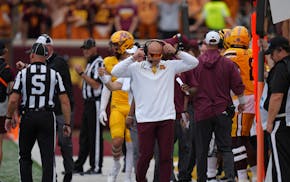
Reusse: Gophers vs. Huskers and an 80th birthday on a fall Friday? Good day to be a homer again
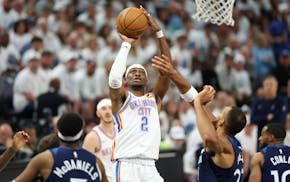
Reusse: Bring on boos, but Gilgeous-Alexander is a deserving MVP
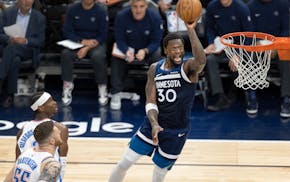
Reusse: A closer study of the Wolves at their absolute best reveals the value of Randle
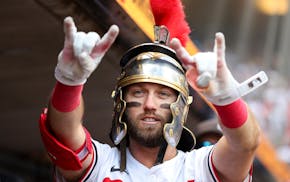

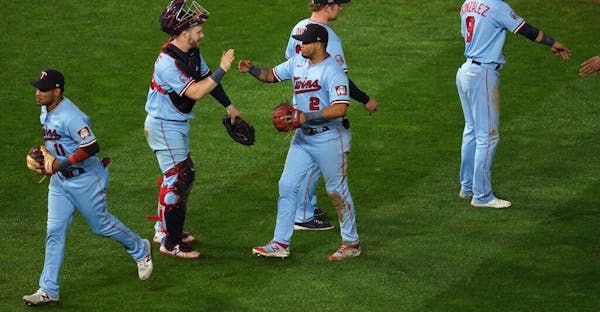
![Minnesota Twins catcher Mitch Garver (18) and Minnesota Twins relief pitcher Taylor Rogers (55) celebrated the win over Cleveland. ] ANTHONY SOUFFLE �](https://arc.stimg.co/startribunemedia/PHGDFARGJ2HB55RI3Z6IFWHIZ4.jpg?w=600&h=600&auto=format%2Ccompress&cs=tinysrgb)